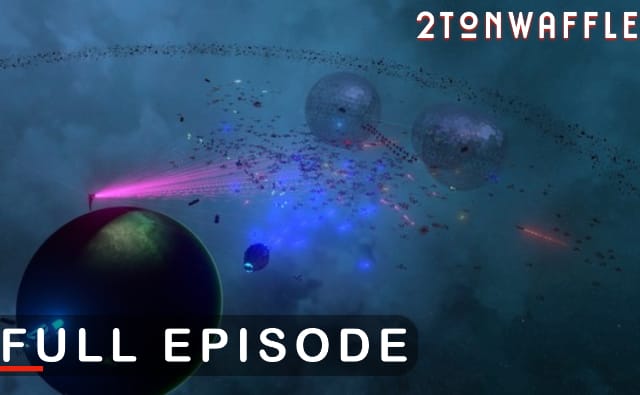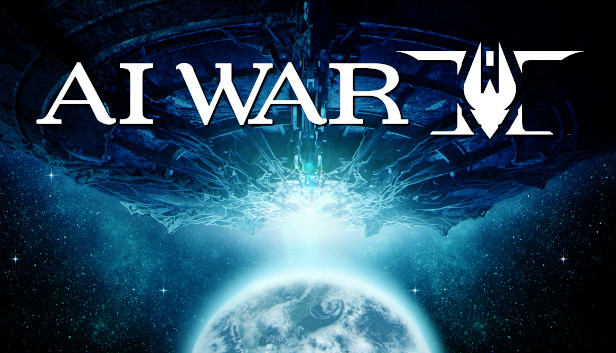AI War 2: When Strategy Games Forget You're Human
AI War 2 is strategy game masochism at its finest. Brutal tutorials, overwhelming complexity, and an AI that gets angrier as you succeed. Perfect for hardcore strategy fans who enjoy pain with their planning. Skip if you value your sanity.

A First Two Hours Deep Dive
TL;DR: What You Need to Know
Hey everyone, Josh here from 2tonwaffle.com, and boy do I have a doozy for you this week. Fresh off another Sunday night stream where I dove headfirst into AI War 2, and let me tell you something right off the bat: this game has absolutely zero respect for your time or sanity. But here's the weird part — I actually enjoyed it once I stopped crying into my keyboard.

The Learning Curve from Hell
Let's start with the elephant in the room: AI War 2's tutorial system. I've played a lot of strategy games, folks. StarCraft, Command & Conquer, even dabbled in some Crusader Kings when I was feeling particularly masochistic. But AI War 2? This thing makes Dark Souls look like a children's picture book.
The tutorials are structured like someone took a manual for a nuclear reactor and decided to make a game out of it. "First, do this. Now do that. Oh, and also remember these seventeen other things while you're at it." It's not that the information is bad — it's actually quite comprehensive. The problem is it dumps everything on you at once like you're some kind of strategy game savant who's been waiting their whole life for this moment.
I spent probably forty minutes just trying to understand the basic fleet management system. We're talking about moving units between planets, understanding the difference between explored, watched, and permanently watched systems, managing multiple resource types, and somehow keeping track of an AI that gets progressively angrier the more you exist in its space. Oh, and did I mention there are hacking mechanics? Because of course there are.
When Tutorial Hell Meets Reality
Here's where things get really fun. Even when you follow the tutorial instructions to the letter, sometimes the game just... doesn't recognize what you've done. I had multiple instances where I'd complete exactly what was asked, only to have the tutorial sit there like a disappointed parent waiting for me to figure out what I did wrong.
This led to one of those classic "screw it, I'm just going to wing it" moments that regular viewers know I'm famous for. And you know what? That's actually when the game started to click. Sometimes the best way to learn a complex system is to break it spectacularly and then piece together what went wrong.
The Meat of the Matter
Once you get past the brutal onboarding process — and I do mean once, because this isn't a maybe situation — AI War 2 reveals itself to be something pretty special. This is a real-time strategy game that operates on a completely different scale than most of the genre. We're not talking about managing a base and an army. We're talking about managing an interstellar rebellion against AI overlords who control most of the galaxy.
The scale is genuinely impressive. The galaxy map shows dozens of connected systems, each with their own strategic value, threats, and opportunities. You're not just building units and throwing them at enemies. You're conducting reconnaissance, planning multi-system invasions, managing supply lines, and constantly weighing the risk-reward of every action because the AI actually adapts to your aggression level.
That's right, there's an "AI Progress" meter that tracks how much attention you've drawn from the mechanical overlords. Blow up too much of their stuff too quickly, and they start taking you seriously. And trust me, you do not want these AIs taking you seriously until you're ready for that kind of heat.
The Good, The Bad, and The Overwhelming
Let's talk about what works. The strategic depth here is absolutely bonkers in the best way possible. Every decision matters. Do you capture this planet for its resources and risk raising your AI Progress? Do you hack that advanced research station even though it'll bring down the heat? Do you focus on building up your defenses or go on the offensive before the AI can consolidate its forces?
The fleet system is genuinely innovative once you understand it. Instead of managing hundreds of individual units, you're managing fleet compositions and strategic assets. Your transport flagships can load up entire armies and ferry them between systems. Your battle stations provide mobile command points for defensive structures. It's elegant in a way that most RTS games never achieve.
But — and this is a big but — the game's presentation is working against it at every turn. The UI is functional but cluttered. There are numbers and meters everywhere, and while they're all important, it feels like trying to pilot a fighter jet using an Excel spreadsheet. During larger battles, the screen becomes a soup of ships and effects where it's genuinely difficult to tell what's happening.
Audio and Atmosphere
I have to talk about the music because it's... weird. Not bad weird, just disconnected weird. The soundtrack is this pleasant, almost classical orchestral music that sounds like it belongs in a bookstore or coffee shop. It's actually quite nice to listen to, but it has absolutely nothing to do with commanding fleets in a desperate war against machine intelligences.
You'd expect something with a bit more gravitas, maybe some tension-building electronic elements, anything that matches the scale and stakes of what you're doing. Instead, you get music that makes you want to browse the philosophy section at Barnes & Noble. It's competent music that's completely wrong for the game it's in.
The Verdict: Respect the Commitment
Here's the thing about AI War 2: it doesn't want casual players. It's not interested in holding your hand or making things easy. This is a game designed for people who want to spend hours learning systems, optimizing strategies, and accepting that they're going to lose spectacularly multiple times before they start winning.
I'm not going to lie to you — I got my butt kicked on the basic difficulty setting. The AI is relentless, smart, and apparently has no concept of mercy. But every defeat taught me something new about fleet composition, defensive positioning, or resource management. By the end of my two hours, I wasn't winning, but I was learning, and more importantly, I wanted to come back.
This is one of those rare games that I can honestly say I'll be keeping in my library. Not because it's immediately gratifying — it absolutely isn't — but because it offers the kind of strategic depth that you can spend months exploring. Every system has multiple layers, every decision branches into three more considerations, and there's always something new to discover.
Should You Play It?
If you're looking for something you can pick up and play for twenty minutes here and there, run. Run far away and don't look back. AI War 2 demands commitment, patience, and probably a notepad for keeping track of everything you need to remember.
But if you're the kind of person who enjoys complex systems, who doesn't mind reading through detailed tooltips, and who gets a genuine thrill out of executing a perfectly planned multi-system operation, then this might be exactly what you've been looking for. Just don't say I didn't warn you about the learning curve.
Final Score: 7.5/10
AI War 2 loses points for its brutal onboarding experience and atmospheric disconnect, but gains them back through sheer strategic depth and innovative design. It's a game that respects your intelligence while simultaneously making you feel like an idiot, and somehow that works.
At 75% off on Steam (at the time of this writing), it's absolutely worth grabbing if you have any interest in deep strategy games. Just clear your weekend first — you're going to need it.
Remember, if you want to see the full disaster of me learning this game in real time, check out the stream archive on my channel. And as always, if you've got suggestions for games I should tackle next, hit me up on the socials. Until next Sunday night's stream, keep gaming and try not to declare war on any AIs without proper preparation.
Later taters!
Josh Bailey streams First Two Hours every Sunday at 9 PM, exploring games from his vast Steam library that he's never properly played. You can find more reviews and gaming content at 2tonwaffle.com, and join the community Discord for discussions about games that will probably hurt your brain in the best possible way.
Frequently Asked Questions
Q: Is this game beginner-friendly?
A: Absolutely not. AI War 2 assumes you have a PhD in strategy games and the patience of a saint. Even the "basic" difficulty will humble experienced RTS players.
Q: How long does it take to learn the basics?
A: Plan for several hours just to understand the core systems. I spent 40 minutes on fleet management alone, and that was with tutorials guiding me.
Q: Are the tutorials actually helpful?
A: Yes and no. They're comprehensive but overwhelming, and sometimes they bug out and don't recognize when you've completed objectives correctly.
Q: Can I play this casually for 20-30 minutes at a time?
A: Not really. This is a commitment game that demands long sessions to make meaningful progress and maintain strategic momentum.
Q: How does the AI difficulty work?
A: There's an "AI Progress" meter that tracks how much attention you've drawn. The more aggressive you are, the more the AI focuses on destroying you specifically.
Q: Is the fleet management system complicated?
A: Very. Instead of controlling individual units, you manage entire fleets with flagship carriers, specialized roles, and complex logistics between star systems.
Q: What's the deal with the music?
A: It's pleasant classical orchestral music that sounds completely disconnected from commanding space fleets in a robot war. Good music, wrong game.
Q: How does this compare to other RTS games?
A: It operates on a much larger scale than StarCraft or Command & Conquer. Think galactic rebellion management rather than base-building skirmishes.
Q: Is it worth the current sale price?
A: At 75% off (around $5), absolutely, if you enjoy deep strategy games. At full price, only if you're certain you want this level of complexity.
Q: Will I rage quit this game?
A: Probably multiple times. The question is whether you'll come back angrier and more determined, or just move on to something that respects your sanity.





